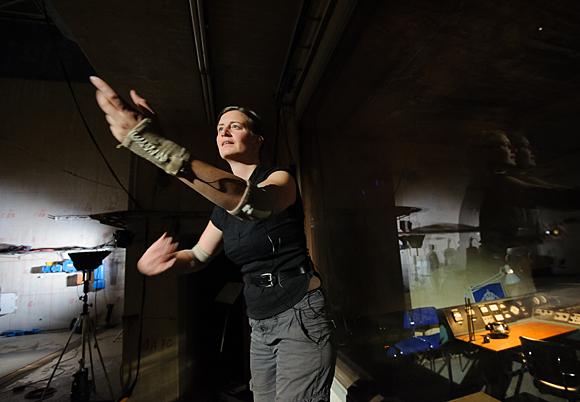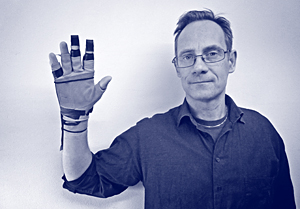Extending the concept of opera through technology
Arts
Technology that frees opera performers from the constraints of an orchestra and conductor is the centrepiece of a work that premiered at KTH Royal Institute of Technology before moving on to South Africa.

The instruments for the short opera, “Sing the Body Electric,” which premiers tonight in the Reactor Hall at KTH, look nothing like the traditional horns and strings played across town at Stockholm’s Royal Opera.
A radio-transmitting glove with built-in sensors, called Throat III, enables the singer to manipulate their voice and create eerie electronic harmonies through movements and gestures. A Virtual Viola da Gamba uses sensors strapped to the arms to generate sounds similar to the Renaissance-era bowed instrument. And with the Vocal Harp, a singer creates ethereal accompaniment by pushing and pulling on metal strings that extend from the stage floor up toward the ceiling.
These are the creations of KTH researchers Carl Unander-Scharin and Ludwig Elblaus, and Luleå Technical University Art and Technology Professor Åsa Unander-Scharin, who have been working together as part of the Extended Opera Course. The course is a collaboration between KTH and Stockholm’s University College of Opera.
In “Sing the Body Electric” the instruments enable a crossover between opera, oratorio, choreography and scenography, Unander-Scharin says. They call it an "Corporatorio".
The “singing glove,” or Throat III, has most captured the public’s attention, particularly since it was featured in the Norrlands Opera production of “The Elephant Man,” based on the life of Joseph Merrick, the 19th Century English man who became famous for his congenital deformities.

Unander-Scharin, a composer and a tenor with the Royal Swedish Opera, says Throat III was inspired by “an artistic need” when he received the commission to write the music for “The Elephant Man.”
“My concern was, how would it be possible to write an opera about someone who could hardly speak and who certainly couldn’t sing?” he says. “It would not make sense to have him portrayed by the sheer beauty of an operatic voice if you don’t take that particular disability into consideration.”
The answer was to be found in Merrick’s deformed hand, which by showing to freak show audiences he was able to escape the horrors of the workhouse. “The Elephant Man’s hand and its connection to the voice became the metaphor that made it possible to write an opera about him,” Unander-Scharin says.
The instrument enables the singer to distort, dissemble and refine their performance. It recently was presented at the CHI 2013 international conference in Paris on human-computer interaction, at the 2012 Rotterdam Opera Festival in the Netherlands as well as in the film, "Artificial Body Voices," on Swedish Television.
“It is useful in all kinds of situations where you want to be able to sing and simultaneously change, influence and accompany the voice with the hand or body movements,” Unander-Scharin says, adding that the technology he is developing could also be used by people with different disabilities to create music with voice and body movements.
Unander-Scharin says that developing technologies that have not been available before is an exciting opportunity for artistic research, and that artistic matters are what drives his and his colleagues’ research forward. “I work as an opera singer, so I'm used to working with performing arts. The performing arts in turn place specific demands on the technology – the reliability on our side must be very high.
“It has to be ready when the audience is ready, as the saying goes.”
David Callahan and Peter Larsson
What: “Sing the Body Electric”
Where: The Reactor Hall R1, KTH Royal Institute of Technology, Stockholm.
When: May 30 at 18.00, May 31 at 19.00, June 1 at 14.00 and 18.00, June 2 at 14.00
Admission is free, but tickets must be booked at: biljett@operahogskolan.se
“Sing the Body Electric” will be performed in South Africa from June 13 to 15.
Visit Carl Unander-Scharin's Electronic Opera website

